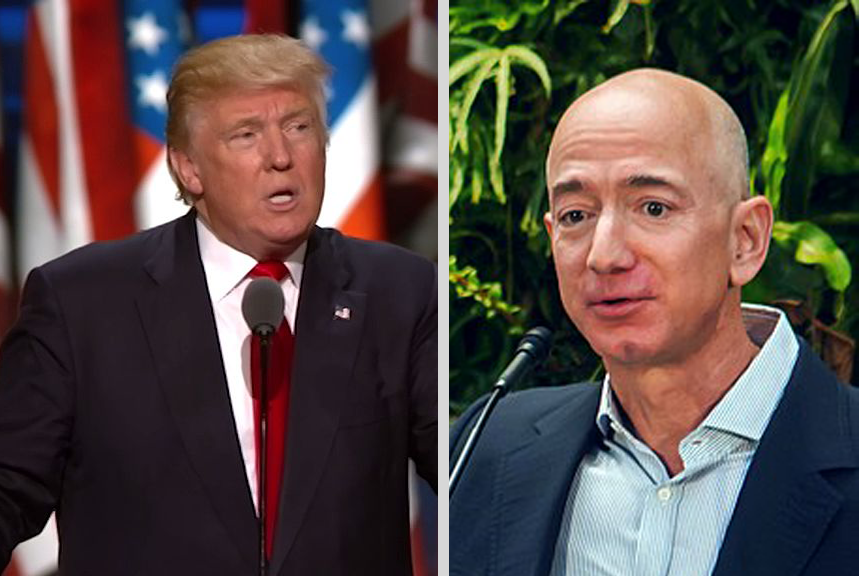Trump’s attacks on Amazon are misguided
Trump abandoned Republican free market ideology by attacking Jeff Bezos.
Trump photo via VOA, public domain. Bezos photo via Wikimedia Commons, creative commons
The president should not use his public office to recklessly attack American companies.
As part of his most recent fixation, President Trump has spent time repeatedly bashing Amazon on Twitter, claiming that the company is actively ripping of the United State Postal Service and is avoiding taxes. First of all, it’s true that the Post Office is posting massive losses, totaling $2.7 billion in 2017, but Amazon is not responsible for their woes. Amazon has actually helped the USPS increase its package deliveries as postcard and letter deliveries continue to decline. As for the tax issue, Amazon does collect state sales taxes on products it sell directly in all 45 states that have a state sales tax.
Additional attacks have come against the Washington Post, a news source Trump has scolded as “Amazon’s lobbyist.” Perhaps he’s trying to send a message to Amazon founder and CEO Jeff Bezos, who also owns the Washington Post, although there is no evidence that Bezos been involved in any editorial affairs. Going after ‘opponents’ has been a staple of the Trump presidency, but this time it’s Corporate America on the receiving end of the criticism.
Though his claims are not completely baseless, publicly lambasting an American company is an abandonment of free-market principles that are a key part of the Republican ideology and are crucial to the country’s prosperity. Amazon, despite putting pressure on retailers across the country, has helped the consumer immensely by prioritizing competitive prices and direct-to-consumer delivery. And while Trump claims that Amazon is killing jobs, they are a top ten employer in the U.S., with over 500,000 employees in 2017.
Amazon, along with the technology sector as a whole, has been a major contributor to sustained momentum in the tech-heavy Nasdaq Composite during the course of the bull market that began in 2009. Recently, however, Trump’s tweets have put added pressure on Amazon in a highly volatile environment for the equity market so far in 2018. For Amazon, a market darling that has been a key part of the overall strength in the market, Trump’s attacks present a potential headwind for the company and the overall market. It’s quite strange that Trump, who has frequently touted the gains in the market indices as a signal of his administration’s success, would intentionally try to weaken a company so vital to the market’s gains.
In the midst of the ongoing criticism, Jeff Bezos has stayed quiet, likely realizing what Amazon could potentially face if Trump takes serious action: antitrust lawsuits, blocked mergers, and being forced into collecting more sales taxes on transactions, though it remains to be seen whether the Trump administration will actually follow through with consequences. Regardless, Bezos will be a formidable opponent, and Trump’s threats may prove to be little more than lip service.




































![Teacher Lore: Mr. Hillman [Podcast]](https://bsmknighterrant.org/wp-content/uploads/2025/03/teacherlorelogo-1200x685.png)





